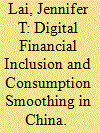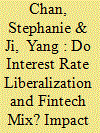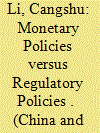|
|
|
Sort Order |
|
|
|
Items / Page
|
|
|
|
|
|
|
| Srl | Item |
| 1 |
ID:
171881


|
|
|
|
|
| Summary/Abstract |
In this paper, we investigate the effect of digital nancial inclusion (DFI) on household consumption smoothing in China. We use four waves of the biennial China Family Panel Studies from 2010 to 2016, during which time DFI has signicantly developed alongside nancial technology across China. We split household income shocks into permanent and transitory components, and evaluate if DFI may help households to buffer against these shocks. We nd that households are not able to insure against permanent shocks to income, but they can smooth approximately 70 percent of transitory shocks to income. We also find that DFI has diminished households’ ability to insure against transitory income shocks. This is partly because online purchase may lead to the oversensitivity of consumption to income. In addition, we nd that contrary to DFI, traditional nancial sector development contributes to better household consumption smoothing against transitory income shocks
|
|
|
|
|
|
|
|
|
|
|
|
|
|
|
|
| 2 |
ID:
171883


|
|
|
|
|
| Summary/Abstract |
The advance of cryptocurrencies has sparked wide concern over their interplay with the existing global financial market. This paper analyzes the risk spillover relation between cryptocurrencies and major nancial assets, and unravels how cryptocurrencies could influence global financial systemic risk. We find that cryptocurrencies function as a separate risk source from traditional assets. Major legislative, financial and technological events in the cryptocurrency market may affect risk spillover dynamics. Although the overall penetration of cryptocurrencies is not yet deep, introducing cryptocurrency can signicantly increase the systemic risk to traditional markets during low risk level episodes
|
|
|
|
|
|
|
|
|
|
|
|
|
|
|
|
| 3 |
ID:
171878


|
|
|
|
|
| Summary/Abstract |
In this paper we attempt to characterize the stability of shadow deposits in China with interest rate liberalization and fintech developments. We emphasize that shadow banks provide higher but riskier returns and such characteristics affect the stability of shadow deposits. In our setting, the stability of shadow deposits is influenced by two offsetting effects, namely: the patience effect, which makes investors more willing to wait because of the potentially higher returns; and the uncertainty effect, which makes investors more likely to withdraw as a result of higher risk. Under liberalized interest rates, the patience effect will erode and the uncertainty effect will be heightened because the post‐liberalization higher return of traditional banks undermines the importance of the extra return of shadow deposits to depositors, while preserving the importance of the risk aspect. Fintech development is modeled as a reduction in the withdrawal cost that facilitates runs. This affects the stability of shadow deposits because of their wider fintech reliance. Regulators should be cautious in pushing interest rate liberalization and fintech application alongside building a safety net for shadow banking.
|
|
|
|
|
|
|
|
|
|
|
|
|
|
|
|
| 4 |
ID:
171880


|
|
|
|
|
| Summary/Abstract |
This paper studies how monetary and regulatory policies manage peer to peer (P2P) interest rates. Based on selected representative monetary and regulatory policies, this paper nds that easy monetary policies reduce the demand for online loans, thus reducing the market’s interest rates. Monetary policies may increase the supply of online loans through rational expectation channels or reduce the demand for online loans through bank risk-taking channels. Normative market-based regulatory policy enables the P2P market to return to rationality, eliminates high-risk investors and borrowers, and subsequently reduces market interest rates. Risk disposal-based regulatory policy reduces market supply to some extent, resulting in a small increase in interest rates. Both easy monetary policies and regulatory policies have a great impact on the normal platforms. The interest rate of high-risk platforms is less affected by the relevant policies, which is evidence that such platforms do not behave in accordance with the nancial rules in general. Monetary policies mainly affect platforms with interest rates in a relatively normal range, while regulatory policies mainly focus on platforms with abnormal interest rates.
|
|
|
|
|
|
|
|
|
|
|
|
|
|
|
|
| 5 |
ID:
171882


|
|
|
|
|
| Summary/Abstract |
his paper uses Renrendai data to study the relationship between monetary policy and the default behavior of borrowers, and analyzes the transmission channels. The research shows that tight monetary policy will lead to a significant increase in a borrower’s probability to default, and this effect will continue for several months. There may be two transmission channels: (i) monetary policy changes a debtor’s liquidity through credit and balance sheet channels, which directly affects their current repayment behavior; and (ii) monetary policy may affect a borrower’s investment, production and protability, thus changing their long-term solvency. The paper also nds that the repayment behavior of productive borrowers is more susceptible to monetary policy than consumptive borrowers, and that the default behavior of borrowers in coastal provinces is more susceptible to monetary policy than of borrowers in inland provinces. These ndings provide new evidence for understanding how monetary policy affects individual behavior and its transmission mechanisms.
|
|
|
|
|
|
|
|
|
|
|
|
|
|
|
|
| 6 |
ID:
171879


|
|
|
|
|
| Summary/Abstract |
The emergence of a digital divide or a lack of internet access may hinder urbanization and adversely affect growth. However, fintech development can help to improve the accessibility and affordability of financial services, particularly for sections of the population formerly excluded from such services. Improved access is expected to stimulate the growth essential for promoting urbanization, possibly alleviating the negative impacts of a digital divide and creating a trickle-down effect. This paper is among the first to investigate the effect of fintech development on urbanization, as indicated by labor transfer from agricultural to non-agricultural sectors in China. It is found that: (i) the digital divide hindered, while fintech development contributed to urbanization; (ii) the positive effect of fintech development on urbanization affects individuals both with and without access to the internet, yielding the so-called trickle-down effect and thus helping to alleviate the negative consequences of a digital divide; and (iii) regarding transmission mechanisms, fintech development helps to generate additional jobs and raise income in non-agricultural sectors, stimulating urbanization even for those without access to the internet.
|
|
|
|
|
|
|
|
|
|
|
|
|
|
|
|
|
|
|
|
|